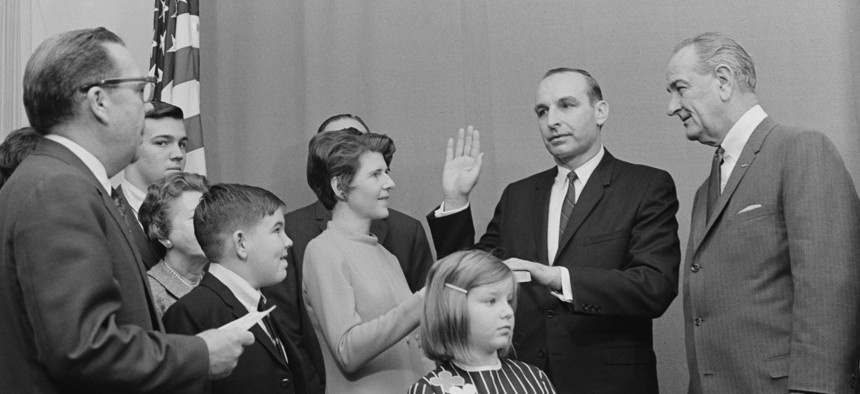New bill looks to modernize 50-year-old rulebook for federal-state cooperation

Charles Zwick, shown here taking his oath of office alongside President Lyndon B. Johnson and his family, led the Office of Management and Budget when Circular No. A-97 was adopted. Michael Ochs Archives/Getty Images
A new Senate bill would require updated guidance and a strategic plan on intergovernmental cooperation, specifically how agencies can give technical and specialized services to states and local governments.
The instructions document federal agencies must follow if they want to give specialized or technical services to state and local governments is dated August 29, 1969.
A new Senate bill would change that, updating the legislation to modernize how different levels of government cooperate to provide essential services like unemployment benefits.
Sen. Gary Peters (D-Mich.), chair of the Homeland Security and Governmental Affairs Committee and Sens. Kyrsten Sinema (D-Ariz.) and Steve Daines (R-Mont.) introduced a bill on Tuesday to rework the legislation dating back to the 1960s with the goal of better coordination between levels of government on important services and the systems used to deliver them at state and local levels.
The lawmakers point to the acquisition of duplicative or ineffective systems by state and local governments trying to execute federal policy.
The sponsors hope the bill's requirement for a new strategic plan on intergovernmental cooperation from the Office of Management and Budget and Office of Intergovernmental Affairs would "help ensure tax dollars are not spent on unnecessary resources to execute core government responsibilities."
The plan would have action items for how the federal government can strengthen the delivery of federal benefits and services delivered by state and local governments, including the use of technical services from executive agencies.
"This commonsense, bipartisan bill will increase cooperation between all levels of government to improve the ability of state and local governments to provide critical services more efficiently and save taxpayer dollars as they help carry out many federal programs," Peters said in a statement.
OMB would have 150 days after the bill becomes law to publish a new strategic plan and 90 days to release new guidance and rescind the 1969 circular on intergovernmental cooperation.
The bill would also require annual reports to the Homeland Security and Governmental Affairs Committee in the Senate and the House Oversight and Reform Committee on services given by agencies to state, local, territorial or Tribal governments under the law, as well as their satisfaction measures, cost savings and any recommendations on how to reduce duplication and improve service delivery in federal programs delivered by state and other local governments.






